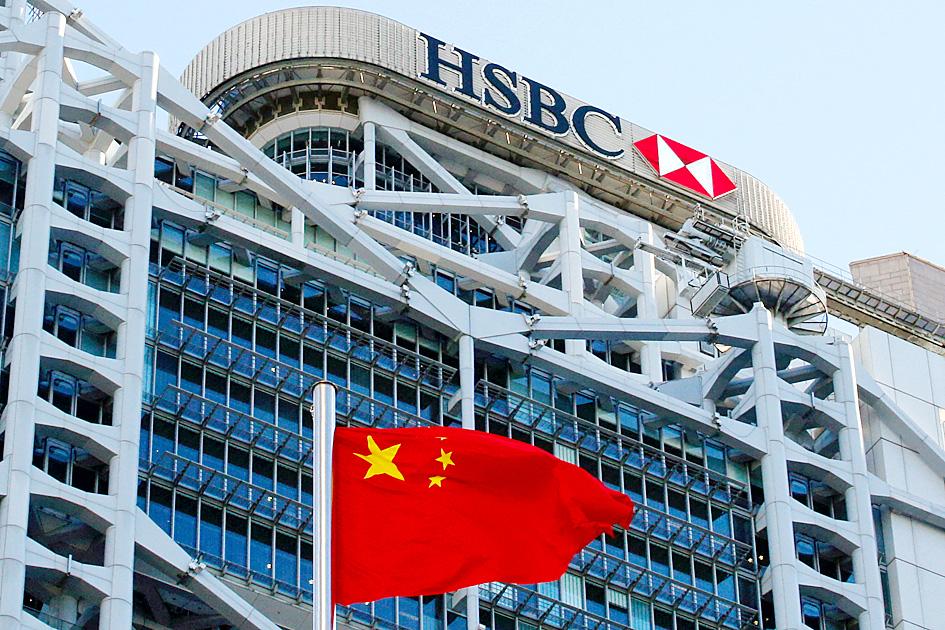A report from the Legislative Yuan’s Organic Laws and Statutes Bureau said that the policy regarding Hong Kong and Macau as “foreign countries” separate from China should be reviewed to protect national security.
Under the government’s standing policy and the Act Governing Relations with Hong Kong and Macau (香港澳門關係條例), the people of both territories are treated as foreigners when investing, working or studying in Taiwan, and are not under the jurisdiction of the Act Governing Relations Between the People of the Taiwan Area and the Mainland Area (臺灣地區與大陸地區人民關係條例), the report said.
Hong Kong investors are given far more options for investment, and the review of their applications is far more relaxed than for Chinese, the report said.

Photo: Reuters
For the whole of last year, there were 49 applications from China to invest in Taiwan, while there were 691 from Hong Kong, an indicator that Chinese are exploiting a legal loophole by registering their companies in Hong Kong, the report said.
Since China imposed its National Security Law on Hong Kong, the “one China, two systems” concept has undergone drastic changes in Hong Kong and Macau, as the Chinese Communist Party (CCP) has been pushing policies to expedite the integration of Hong Kong and Macau with China.
The report cited a fundamental change in Hong Kong’s population dynamics, as 1.25 million Chinese have immigrated to Hong Kong in the past 25 years.
That does not include those Chinese who have immigrated because of Hong Kong’s project to attract Chinese talent, the report said, adding that the population of Chinese in Hong Kong comprises a significant portion of the territory’s population of 7 million people.
The shifting population dynamics, along with a shift in Chinese policies toward the governing of Hong Kong and Macau, has created doubts regarding the autonomy both territories have, and the government should reconsider its policies for them, it said.
Moreover, the government must consider the national security implications of such policies, as Taiwan, which is reliant on its high-tech industry, can ill afford to have Chinese investors siphon off its talent pool using Hong Kong companies as a front, the report said.
While amendments to the Act Governing Relations Between the People of the Taiwan Area and the Mainland Area have been made to stop Chinese investors from exploiting loopholes, no follow-up amendments have been made to the Act Governing Relations with Hong Kong and Macau, the report said.

The US government has signed defense cooperation agreements with Japan and the Philippines to boost the deterrence capabilities of countries in the first island chain, a report by the National Security Bureau (NSB) showed. The main countries on the first island chain include the two nations and Taiwan. The bureau is to present the report at a meeting of the legislature’s Foreign Affairs and National Defense Committee tomorrow. The US military has deployed Typhon missile systems to Japan’s Yamaguchi Prefecture and Zambales province in the Philippines during their joint military exercises. It has also installed NMESIS anti-ship systems in Japan’s Okinawa

‘WIN-WIN’: The Philippines, and central and eastern European countries are important potential drone cooperation partners, Minister of Foreign Affairs Lin Chia-lung said Minister of Foreign Affairs Lin Chia-lung (林佳龍) in an interview published yesterday confirmed that there are joint ventures between Taiwan and Poland in the drone industry. Lin made the remark in an exclusive interview with the Chinese-language Liberty Times (the Taipei Times’ sister paper). The government-backed Taiwan Excellence Drone International Business Opportunities Alliance and the Polish Chamber of Unmanned Systems on Wednesday last week signed a memorandum of understanding in Poland to develop a “non-China” supply chain for drones and work together on key technologies. Asked if Taiwan prioritized Poland among central and eastern European countries in drone collaboration, Lin

The Chien Feng IV (勁蜂, Mighty Hornet) loitering munition is on track to enter flight tests next month in connection with potential adoption by Taiwanese and US armed forces, a government source said yesterday. The kamikaze drone, which boasts a range of 1,000km, debuted at the Taipei Aerospace and Defense Technology Exhibition in September, the official said on condition of anonymity. The Chungshan Institute of Science and Technology and US-based Kratos Defense jointly developed the platform by leveraging the engine and airframe of the latter’s MQM-178 Firejet target drone, they said. The uncrewed aerial vehicle is designed to utilize an artificial intelligence computer

Renewed border fighting between Thailand and Cambodia showed no signs of abating yesterday, leaving hundreds of thousands of displaced people in both countries living in strained conditions as more flooded into temporary shelters. Reporters on the Thai side of the border heard sounds of outgoing, indirect fire yesterday. About 400,000 people have been evacuated from affected areas in Thailand and about 700 schools closed while fighting was ongoing in four border provinces, said Thai Rear Admiral Surasant Kongsiri, a spokesman for the military. Cambodia evacuated more than 127,000 villagers and closed hundreds of schools, the Thai Ministry of Defense said. Thailand’s military announced that